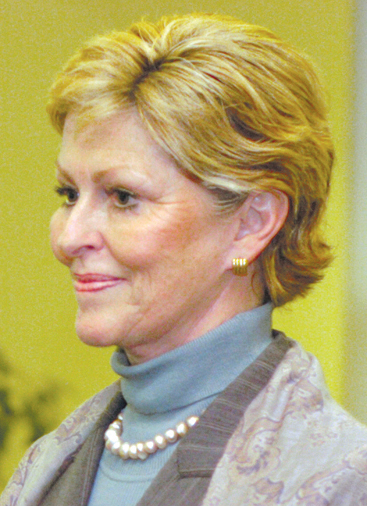AUGUSTA — Developing a concierge model for student services and creating technology-rich academic offerings will be the top priorities for the University of Maine at Augusta this year.
That’s according to President Allyson Handley, who in her annual state of the university address Friday morning said UMA must focus on those areas to survive trying times.
“Some might say we are in the midst of a tsunami, as higher-education funding continues to unravel and critiques of higher-education productivity abound in the media,” Handley said at a welcoming breakfast for faculty members. “The time has come for UMA to truly imagine what we want to become.”
Handley said UMA can build on its strengths, including its history of educating older adults. More than 75 percent of UMA’s students are older than the traditional college age range of 18 to 24, and Maine’s population of college-age students is projected to decline 20 percent in the next four years.
At UMA, more than 70 percent of students are 25 or older, Handley said.
“We are well positioned to assume a leadership role as a student-focused baccalaureate institution, with technology-rich and flexible offerings,” she said.
University College, the University of Maine System’s online and distance education program, is administered through UMA. Handley is its interim executive director.
Handley said she has instructed Vice President for Academic Affairs and Provost Joseph Szakas to expand UMA’s online offerings and the use of the Internet rapidly as a resource for instruction.
“To prepare all of UMA’s students to compete, ideally all of UMA’s classes should include technology-rich content,” Handley said. “In fact, arguably, we are doing our students a disservice if we do not prepare them to use technology-based personal and professional tools.”
The other area of focus this year will be student services. Greg LaPointe, executive director of institutional research and planning, said in an interview that student services includes most of what happens at UMA outside the classroom: financial aid, advising, admissions and more.
LaPointe said the university staff should be advocates for students in every interaction that affects students, even indirectly.
He will be co-chairman of a committee with interim Dean of Enrollment Services Sheri Fraser to develop a new plan for student services. They may model it after the concierge approach being used at schools such as National University, the second-largest private college in California, which provides a one-stop center for students.
Something like that could be very helpful for UMA’s students, LaPointe said.
“If you look at the profile of our students, in many cases it’s the first time they’re attending,” LaPointe said. “They have other responsibilities. This whole process can be at times kind of scary, and they need extra support; this is not the only thing they’re working on.
“We want to check in with you, and at the end of the day, we’re here to make sure you graduate.”
Handley said it will take creativity and imagination to keep UMA sustainable.
“UMA and the University of Maine System must continue to address the continuing decline in funding for higher education in our state,” she said. “This will necessitate some difficult but unavoidable choices in the coming year as we work to live within our financial means.”
In her address, Handley also mentioned several changes in administration, grants secured by faculty and staff and other initiatives, such as a policy establishing a tobacco-free campus, which drew applause from the audience. As announced publicly this week, use of tobacco products on UMA’s campuses will be prohibited starting in January.
Send questions/comments to the editors.



Success. Please wait for the page to reload. If the page does not reload within 5 seconds, please refresh the page.
Enter your email and password to access comments.
Hi, to comment on stories you must . This profile is in addition to your subscription and website login.
Already have a commenting profile? .
Invalid username/password.
Please check your email to confirm and complete your registration.
Only subscribers are eligible to post comments. Please subscribe or login first for digital access. Here’s why.
Use the form below to reset your password. When you've submitted your account email, we will send an email with a reset code.